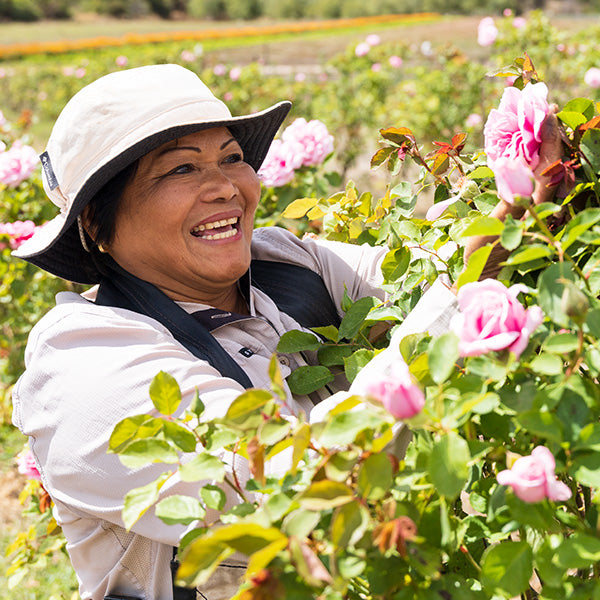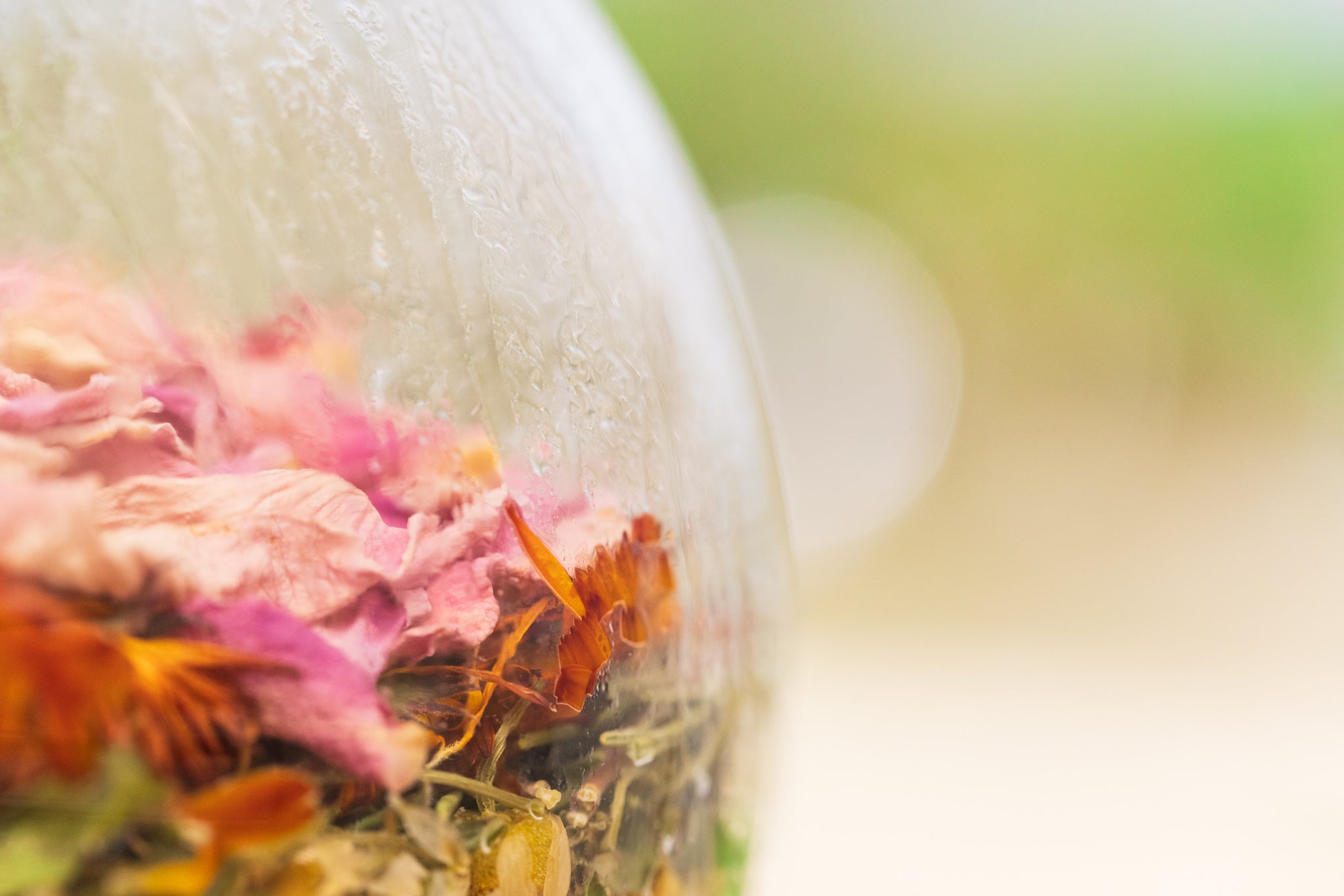In this new series, ‘Face Facts’, we’ll cover your top skin concerns – like dry skin – by examining what they are, symptoms, causes and how to address them. Here, you’ll find the knowledge and tools you need to understand the forces impacting your skin, with a focus on reconnecting your body with your actions to address skin concerns in a holistic way.
By nurturing your skin, you value and nurture yourself. Read on to learn how you can help your dry skin heal, to do just that.
YOUR SKIN
Your skin protects your body from the world around you. It shields you from the elements, helps control body temperature and is responsible for your sense of touch.
Skin is composed of two layers, the epidermis and dermis, and both have several layers of their own. The epidermis is your skin’s outermost layer and produces keratin, a protein that gives skin its protective nature (it also prevents moisture loss). The dermis is your skin’s underlying layer and produces collagen and elastin, proteins that give skin its strength and flexibility. The dermis is also where you’ll find the body’s oil and sweat glands, as well as hair follicles.
Your skin is your body’s largest organ, so caring for your skin and paying attention to what it’s trying to tell you are essential for both your skin and your body’s health and wellbeing.
WHAT IS DRY SKIN?
Dry skin is moisture loss from your skin’s outermost layer, the epidermis.
Epidermal skin cells have a 1-month cycle of birth, life, death and rebirth. The topmost layers of epidermal cells, the stratum corneum and stratum lucidum, are the skin’s barrier zone, containing dead cells that hold water and waxy fat until they are shed. When functioning properly, these cell layers form snug grids, creating a waterproof matrix that safeguards healthy underlying skin.
When your skin is dry, however, these cells lose moisture and shape, so their ability to protect underlying skin is compromised, with water escaping through the surface. The result? Visibly dry, scaly or flaking skin that feels rough to the touch. On the face, this is most common along its periphery, like your cheeks, jawline and chin (the ‘U-zone’).
Prolonged dehydration increases your likelihood of sensitivity and premature ageing, so recognising dry skin as your skin in distress is the first step on the path to better looking skin.
HOW DO I KNOW IF I HAVE DRY SKIN?
Signs of dry skin can include:
Scaliness or flaking
Roughness
Tightness, especially after cleansing
Ageing, especially fine lines around the eyes where skin is thinnest
WHAT CAUSES DRY SKIN? AND WHAT CAN I DO ABOUT IT?
ENVIRONMENT
Dry air can cause dry skin. Seasonal extremes like cold winters and hot summers alter humidity levels, lessening the amount of moisture in the air and on your skin – icy winds and burning sun can make things worse. Even climate control like heating and air conditioning can dehydrate skin.
To avoid this, cover extremities with extra layers like scarves and gloves that create a barrier against the winter chill; in summer, make sure to wear a hat and sunscreen. Indoors, a humidifier can counteract the effects of internal heating and cooling systems dehydrating your skin.
Wild Roses
However, if your skin is already dry, you will need to add moisture back in. A rich cream with Rose extract will replenish susceptible areas like your face and hands, and contains powerful antioxidants to improve skin health and vibrancy. Drinking more than 2 litres of water daily will also keep your body hydrated during times when skin is more prone to dryness.
AGEING
Ageing can cause dry skin as your body’s hormone levels alter. Over time, estrogen production wanes, reducing the amount of collagen and elastin in skin – the proteins that give your skin its structure and elasticity. Skin oil (sebum) production also diminishes. The body’s thyroid function and metabolism slow, and cell turnover occurs less frequently, leaving dead skin cells to build up for longer on the surface. When menopause occurs, these dry skin contributors reach peak intensity, resulting in dry, itchy, and sometimes, cracked skin requiring regular attention and care.
Anti-ageing Cream
In addition, sun damage caused by UV rays can cause dry skin, with photo-ageing giving skin a thick, leathery appearance.
To combat age-related dry skin concerns, you need to prioritise pure, potent products that restore skin suppleness, plumpness and smoothness.
At Jurlique, we’ve developed targeted pure and potent formulas to combine dry and age-related skin concerns. For visible signs of ageing, our Purely Age Defying Firming Face Oil smooths and evens the appearance of lines, tone, texture and wrinkles, and is best used overnight when skin restoration occurs. This moisturising oil contains ingredients like Safflower Oil to help re-forge the skin’s barrier function, as well as Avocado oil to moisturise more deeply.
For mature skin with advanced signs of ageing, from deep lines and wrinkles to sagging and uneven texture, is the answer. This powerful anti-ageing serum helps skin feel retexturised and rejuvenated skin, with ingredients like Meadowfoam to deeply moisturise and soothe dry, itchy areas on the face, as well as Oat extract to form a protective film to protect against future dryness.
DIET
Drinking caffeine and alcohol dehydrates the body, with your skin directly seeing the effects. Recognising the impact of your lifestyle on your skin is pivotal to swapping these behaviours for new ones that will help your skin back to health.
Healthy Salad
Limiting caffeine and alcohol intake goes a long way to reversing the effects of skin dryness. If you’re really going to miss your morning coffee or tea, there are always other options, such as matcha, a type of green tea that gives you all the benefits of caffeine, but without the jitteriness or afternoon crashes.
TOPICAL ACNE PREPARATIONS
Some acne preparations can cause dry skin as a treatment side effect. Alcohol-based products, often recommended for their anti-bacterial properties, can lead to skin dryness and peeling, even irritation.
Switch to a blemish cream with less drying ingredients, and products containing Calendula extract to help soothe redness and rebalance sensitivity.
SKIN TYPE
Some skin types are simply dryer than others thanks to our genetics. If this is you, then preventative action, as well as looking out for dry skin symptoms (like tightness after cleansing and scaliness or flaking), will help you manage dry skin.
If you’ve only just begun to experience dry skin, our Hydration Starter Set has everything you need to replenish and protect: Rose Moisture Plus Moisturising Cleanser, Moisture Replenishing Day Cream, Skin Balancing Face Oil and Rosewater Balancing Mist. This set targets dehydration and prevents moisture loss and environmental aggressors, using Rose extract to achieve your skin’s perfect balance of water and oil for optimum hydration.
Your skin is a barometer for what’s going on in your body, and your life. Treat it well, and you’ll enjoy a long, happy relationship together.
SHOP THE STORY
Moisture Replenishing Day Cream
Moisture Replenishing Day Cream
Rose Hand Cream
Rose Hand Cream
Purely Age Defying Firming Face Oil
Purely Age Defying Firming Face Oil
Blemish Cream
Blemish Cream 15ml
Hydration Starter Set
Hydration Starter Set







